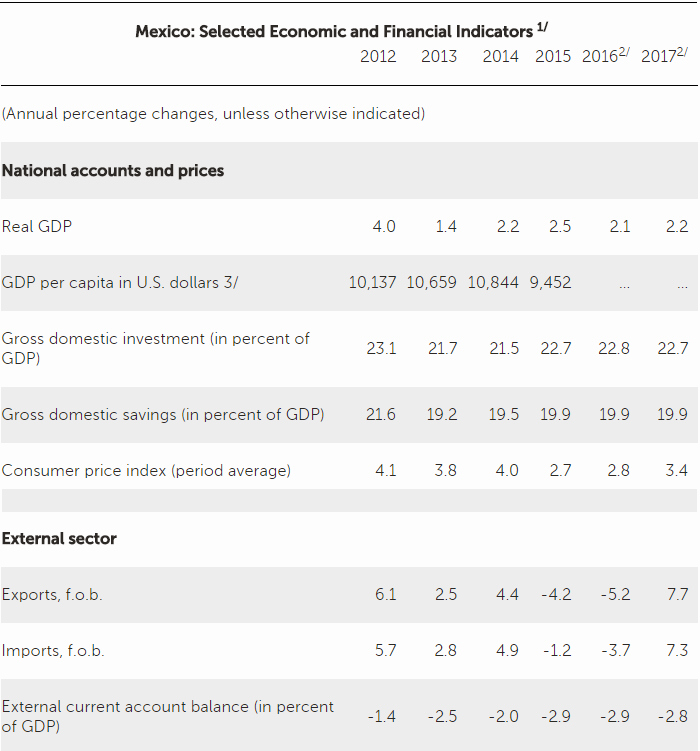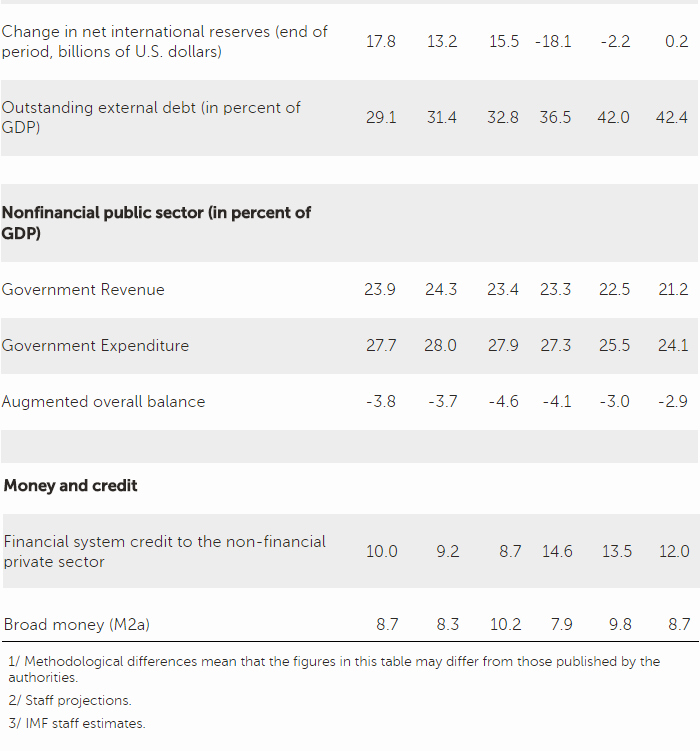IMF Executive Board Concludes Article IV Consultation with Mexico
On November 16, 2016, the Executive Board of the International Monetary Fund (IMF) concluded the Article IV consultationwith Mexico.
Mexico has navigated successfully a complex external environment, characterized by heightened global financial market volatility. The economy continues to grow at a moderate pace and inflation is close to the target. The flexible exchange rate is playing a central role in helping the economy adjust to external shocks. Macroeconomic policies remain focused on maintaining strong fundamentals. Continued implementation of the structural reforms agenda should help lift potential growth over the medium term.
The economy is projected to grow by 2.1 percent in 2016. The main driver of activity remained private consumption, supported by a rise in remittances and improving labor market conditions. Weakness on U.S. industrial activity led to lower demand for Mexico’s manufacturing exports, and a slowdown of investment in machinery and equipment. Growth is expected to remain at a similar level in 2017, supported by strengthening external demand. Year-on-year headline and core inflation are close the 3-percent target. There is no evidence of second-round effects from the exchange rate depreciation and medium-term inflation expectations remain well anchored.
The stance of macroeconomic policies has turned more restrictive. Since last November, the Bank of Mexico increased the monetary policy rate by cumulative 175 basis points to 4.75 percent. The public sector fiscal deficit will be reduced from 4.1 percent of GDP in 2015 to 3 percent of GDP this year. The authorities are taking measures to strengthen PEMEX’s financial position through sizable permanent expenditure cuts, a reform of its pension scheme, and financial assistance from the federal government.
The external sector position remains broadly consistent with medium-term fundamentals and desirable policy settings. The current account deficit is projected to remain unchanged at about 3 percent of GDP in 2016, as the reduction in the hydrocarbons trade balance has been offset by stronger remittances and net service exports. The net international investment liability position is sustainable and foreign exchange reserves remain adequate.
Executive Board Assessment
Executive Directors noted that Mexico continues to grow at a moderate pace despite a challenging external environment. However, the country remains exposed to external shocks, including risks of growing protectionism, given its strong financial and trade linkages with the rest of the world. Directors expressed confidence that Mexico’s strong fundamentals and policy frameworks will continue to underpin the economy’s resilience, but urged vigilance to potential shocks. They noted that the Flexible Credit Line arrangement with the Fund provides additional insurance against tail risks. Continued implementation of the structural reform agenda and further progress in improving security and the rule of law should help lift potential growth in the medium term.
Directors welcomed the authorities’ commitment to continued fiscal consolidation.
They emphasized that adhering to the planned fiscal consolidation is critical in order to bring the ratio of public debt to GDP on a downward path. They welcomed the ongoing efforts to strengthen the financial viability of the petroleum company (PEMEX), which is an important element of the consolidation plan. They generally urged the authorities to take advantage of revenue windfalls, including any future transfers of surplus from the Bank of Mexico, to reduce the public sector borrowing requirement below target. They also encouraged elimination of electricity subsidies while protecting vulnerable households through targeted social assistance programs.
Directors recommended that the authorities consider boosting fiscal revenues in the medium term to avoid constraining capital spending excessively. Raising pension contributions under the defined-contribution system would help ensure adequate pension replacement rates and diminish pressures on public social spending in the future. Directors also encouraged the authorities to further strengthen the fiscal framework, including improving the link between desirable levels of public debt and medium-term fiscal deficit targets, and reducing discretion under the exceptional circumstances clause.
Directors agreed that future monetary policy decisions should remain data-driven and urged the authorities to be vigilant. Clear communication by the central bank will remain important in guiding market expectations. Directors emphasized that the flexible exchange rate should continue to act as the key shock absorber to help the economy adjust to external shocks.
Directors welcomed the conclusion of the 2016 Financial Sector Assessment Program that the balance sheets of financial and non-financial corporations are resilient to adverse shocks. They noted that enhancing some elements of the crisis-preparedness and deposit insurance frameworks would ensure an agile and well-coordinated response in times of stress. Strengthening the independence of the supervisory agencies would also be important. Directors welcomed the staff clarification that decisions of the Financial Stability Council (CESF) have not been hampered by political considerations and encouraged the authorities to maintain their efforts in this regard. Some Directors noted that the appropriate structure and governance of the regulatory and supervisory framework depends on each country’s circumstances and that there is no one-size-fits-all model.
Directors welcomed the authorities’ progress on structural reforms. They encouraged continued efforts to reduce poverty and inequality, increase female labor force participation, and enhance access to financial services. They supported efforts to improve the efficiency of social spending, increase access to child-care services, and better enforce anti-discrimination laws in the labor market. They looked forward to the implementation of the new national strategy for financial inclusion to improve access to financial services for low-income households and small enterprises. They also recommended continued efforts to tackle corruption and strengthen the anti-money laundering framework.


Source: International Monetary Fund
- 254 reads
Human Rights
Fostering a More Humane World: The 28th Eurasian Economic Summi

Conscience, Hope, and Action: Keys to Global Peace and Sustainability

Ringing FOWPAL’s Peace Bell for the World:Nobel Peace Prize Laureates’ Visions and Actions

Protecting the World’s Cultural Diversity for a Sustainable Future

Puppet Show I International Friendship Day 2020

